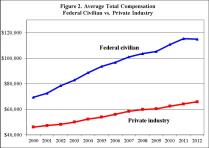What are the main problems with government bureaucrats?
Is it that they’re paid too much?  Given that they get far more compensation than workers in the economy’s productive sector, that’s certainly true.
Given that they get far more compensation than workers in the economy’s productive sector, that’s certainly true.
Is it that there are too many of them? Well, we have lots of bureaucracies that shouldn’t exist, such as HUD, Education,Transportation, Agriculture, etc. So that’s true as well.
But there’s another possible answer. People employed by government take advantage of preferential rules in ways that should get all decent people upset.
Writing for Reason, Eric Boehm tells us about a cop who successfully mugged taxpayers in Paterson, New Jersey.
Despite not having to show up for work since June 2007, Manuel Avila received periodic increases in pay, managed to double his monthly pension and qualified for free healthcare for the rest of his life at the expense of city taxpayers. Avila qualified for all those benefits while spending the past nine years on paid leave from the Paterson, New Jersey, police department because he was under investigation for having sex with a female prisoner at the city’s jail.
Wow, go fishing every day, get pay increases, a fat pension, and free healthcare. Where can I sign up for that deal?
Government, of course.
And let’s not overlook sex with a female prisoner, which gives a whole new meaning to the notion of fringe benefits. Reminds me of the Pennsylvania bureaucrat who came up with the clever idea of trading welfare benefits for sex.
But the story is actually more disturbing (at least from the perspective of taxpayers) than you think.
It gets worse, though, because that crime would never have happened if Avila’s bosses hadn’t already been trying to give his retirement benefits a little boost. …Avila—apparently with plenty of help, or at least an abundance of people willing to look the other way—was able to boost his annual pension to about $70,000 from an estimated $32,000 if he had been forced to retire in 2007 when a police psychiatrist recommended removing Avila from the force. “But instead of forcing Avila out of the police department, city law enforcement officials decided to allow him to stay on the job for another six months so he could reach a critical pension milestone of 20 years, the court records show,” the Paterson Press wrote. While there, he was charged with sexually assaulting a female prisoner. Those charges were dropped in 2010 after the city paid an undisclosed amount of money to the accuser as part of a settlement, but Avila remained on paid leave from the department until finally retiring this year.
This is galling. If Mr. Avila misbehaved and was declared unfit, why wasn’t he immediately terminated?
And now that we’ve learned about this scandal, why aren’t the officials who enabled this ripoff being fired?
At the risk of repeating myself, the answer is government.
There are two broader policy lessons from this scandal.
First, the use of “defined benefit” pension systems for bureaucrats should be discontinued. By way of background, these “DB” plans promise workers guaranteed monthly payments based on formulas including factors such as years worked and highest pay levels. There is no reason why DB plans can’t be feasible and successful (indeed, the Netherlands has a private Social Security system based on this model), but politicians at the state and local level repeatedly have demonstrated that they are incapable of operating this type of system, both because they promise lavish benefits (on top of overly generous pay levels) as a means of buying political support (using our money) from government workers and because they then don’t set aside enough money to finance the generous benefits they have promised. That system may be good for getting reelected in the short run, but it’s also why there’s a multi-trillion dollar shortfall that is contributing to deep fiscal problems in states such as Illinois and California. To stop from going deeper into the red, states should switch to “defined contribution” plans, which work similar to the IRAs and 401(k)s that are now prevalent in the private sector.
Second, something needs to be done to curtail the power of government unions. It’s not just that they conspire with politicians to get excessive pay for bureaucrats, but they compound that damage by also insisting on rules that make it very difficult to discipline or terminate problem employees. In the private sector, employees generally work “at will,” which means they can be fired without reason (this is one of the reasons the United States is near the top of the World Bank’s Doing Business ranking. In government, by contrast, slackers, troublemakers, and other undesirable employees are shielded from this discipline. And that results in cases (such as the example discussed above) that are bad for taxpayers and bad for government. I don’t know if this means that unions should be prohibited (as even President Franklin Roosevelt believed), but surely one less to be learned is that there needs to be a much tougher approach when contract negotiations take place.
